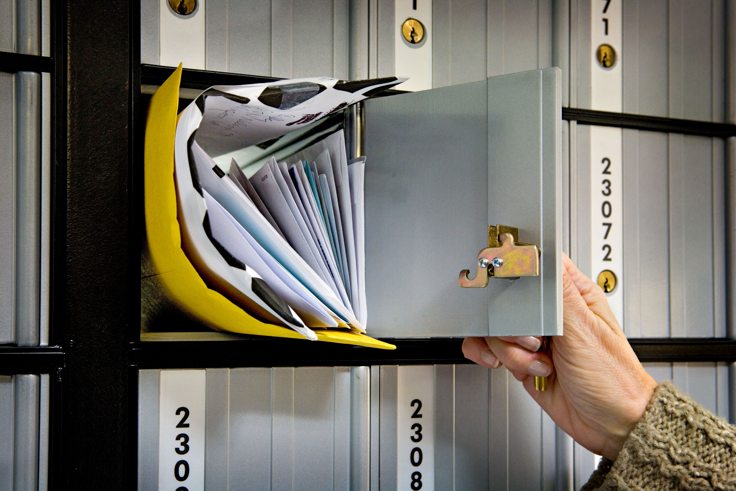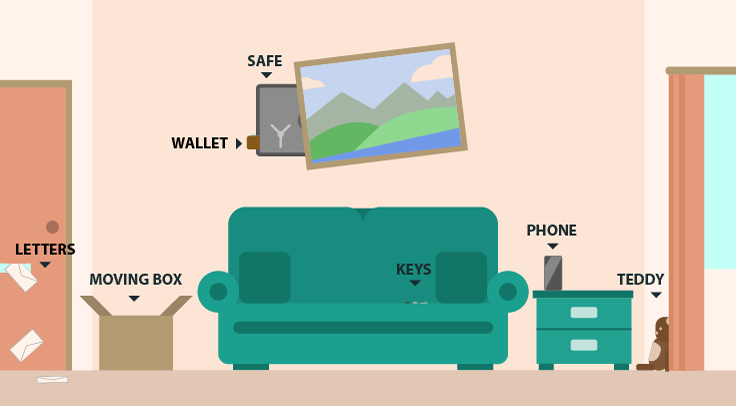Finding a pound coin lying on the street would brighten anyone's day. Almost all would choose to pocket the coin, and that would be the end of the matter. Only, when homebuyers move into a new property; goods left from the previous owner are likely to be of more value. And, in the case of non-valuable items such as letters; they are likely to appear more frequently too. So, is the old adage ‘finders-keepers’ really true? Or, have you a legal obligation to return the missing goods? We investigate…
Q: The last occupants left what appears to be a 'moving box' – are the contents now my property?
A): No
As noted by the Telegraph:
‘You have a duty to write and inform the vendor that he has left it behind and invite him to claim it by a certain date; if he fails to meet the deadline, the property becomes yours.’
Course of Action:
According to the CAB, the seller is under an obligation to empty the house of all their furniture and belongings, unless you agree otherwise with them. If the seller has left some belongings in the house you should ask the seller to remove them. If the seller cannot or will not remove the items you will have to arrange to have them moved. Moving the items may cost you money and you could try to recover this from the seller. However, if the seller refuses to cover the costs you may have to take the seller to court to recover the money and this is unlikely to be worthwhile.

Photo credit: meatheadmovers.com
Q: The old tenants / home-owners have items delivered here still – am I allowed to open them?
A): Short answer – no.
Long answer – UK law, cited on parliament.uk states:
127. Section 84 (1) provides for it to be an offence if persons intentionally delay or open postal packets without reasonable excuse. It amalgamates the content of offences previously included in the Post Office Act 1953.
128. Subsection (3) makes it an offence for a person, intending to act to a person's detriment and without reasonable excuse, to open a postal packet which he knows or suspects has been incorrectly delivered to him.
Course of Action:
According to citizensadvice.org.uk:
You know the recipient’s new address
- Cross out the address – but not the name
- Write ‘no longer at this address, please forward’ and their new address on the front of the envelope
- Put it in a post box
You don’t know the recipient’s new address
- Cross out the address – but not the name
- Write ‘not known at this address, return to sender’ on the front of the envelope – don’t worry if you don’t know who the sender is
- Put it in a post box
If it didn’t have your address on it at all – for example it was meant for a neighbour with a similar postcode, you should:
- Write 'misdelivered to', and your address, on the front of the envelope
- Put it in a post box

Q: I’ve found a sum of money – how much before I need to inform the police?
A): Legally, you are not obliged to hand money into the police however, you could get into some hot water if you choose not to.
Course of Action:
As noted by the Telegraph; a spokesman for Kent Police force said:
“Lost property is not a police matter and from June, Kent Police will only accept recovered property which poses a risk to the public, such as identification, firearms and items believed to be associated with crime.
“People who find lost property are advised to take reasonable steps to reunite it with its rightful owner, such as advertising its discovery on social media and putting posters up in the area it was found.”
In November 2013, The Guardian reported on an unusual happening, where:
A dog walker in Spalding, Lincolnshire spotted £60,000 floating in a waterway. She handed it over to the police, who are carrying out a forensic examination of the money to trace where it came from. The suspicious nature of bagged money in a river would suggest crime as a potential reason for it being there. This being the case, the money will be returned back to the public purse rather than to the woman who made the find.

Q: The last home-owners left some items of questionable origin – do I need to inform anyone?
According to 2014/15 Crime Survey for England and Wales, published on Gov.uk:
‘The 2014/15 CSEW shows that around 1 in 12 (8.6%) adults aged 16 to 59 had taken an illicit drug in the last year, which equated to around 2.8 million people.’
Course of Action:
Derbyshire.police.uk advises:
- If you find any prescription drugs or medicines, please take them to the nearest chemist who will dispose of them safely.
- If you find needles in the street, your local council has a duty to remove these. Prior to contacting your council ensure that you do not touch the items, which includes placing them in a bin.

Q: I was re-landscaping the garden and unearthed some property – is this now mine?
A): Potentially…
As noted by the telegraph.co.uk:
‘If you dig up treasure in the garden of which the previous owner was unaware, says Crispin Harris of Jackson-Stops & Staff, the property comes under the laws of treasure trove. If it's gold and deliberately buried – to protect them, say, from being stolen during the Civil War – then the Crown has a claim on the property (though will pay you compensation); if, on the other hand, the treasure was simply lost or forgotten by a previous owner, then it is yours.’
Course of Action:
According to the Government’s website, under the Treasure Act of 1997, you must report suspected treasure (coins over 300 years old or items containing significant amounts of gold or silver) to a local coroner within 14 days of finding it, or risk a 3-month jail sentence/£3,000 fine. An inquest is then held, involving the site occupier and landowner of where the treasure was found. The Treasure Valuation Committee will decide how much the treasure is worth and how much will go to anyone entitled to a share of the find, which may include the finder, tenant and/or landlord. If you act in bad faith (eg by trying to hide the find) you may get a reduced share of the reward, or none at all. If the find doesn’t count as treasure or no museum wants it, the items will be returned to you, although if you are a tenant or leaseholder, your landlord/freeholder may have a claim. They have 28 days to launch an objection.

Q: Are fixtures and fittings left behind now legally mine?
A): Yes
According to thisismoney.co.uk:
‘A buyer should always be provided with a Fixtures and Fittings, or 'Home Contents', list completed by the seller to indicate exactly what is and isn't being taken.’
The list forms part of the sale contract and therefore if something is taken which should have been left the seller is in breach of contract The buyer should tell their conveyancer straight away – we would correspond with the seller’s conveyancer in an attempt to have the items returned.’
Course of Action:
As noted by telegraph.co.uk:
‘Items left behind by the previous owner are rarely wanted: mangy old bed ends, for instance. If you inspect the property prior to completion and find it full of rubbish you can refuse to complete the purchase until the offending items are removed; if however, like most people, you are too busy clearing out your old house to visit the new one just before completion, then you are deemed to be the legitimate new owner of that rusty old bicycle in the shed.’
Either keep or, if you don’t wish to keep them and the items are in good condition; offer the items to local charities.

Q: I’ve found a wallet – may I keep the contents?
A): No
Again, as noted by the Telegraph:
‘You have a duty to write and inform the vendor that he has left it behind and invite him to claim it by a certain date; if he fails to meet the deadline, the property becomes yours.’
However, this would exclude anything with personal information attached to it, for example; credit cards, passports and birth certificates etc.
Course of Action:
According to creditcards.com:
If you find an entire wallet, with a person's ID, currency and credit cards, it is appropriate to call the authorities. But if you find just a single credit card, experts say there are more effective ways to help: "Most police forces run quite lean, and need to use their time to pursue serious crimes and criminals. They don't have time to pick up a lost credit card from you, or to track down its owner," says Meyer. "From a financial institution point of view, we'd prefer you just call the number on the back of the card, which will direct you to the bank that issued the card."
Meyer says customer service representatives will most likely ask you to destroy the card after you share the person's name and account number. They'll also take care of notifying the owner.








